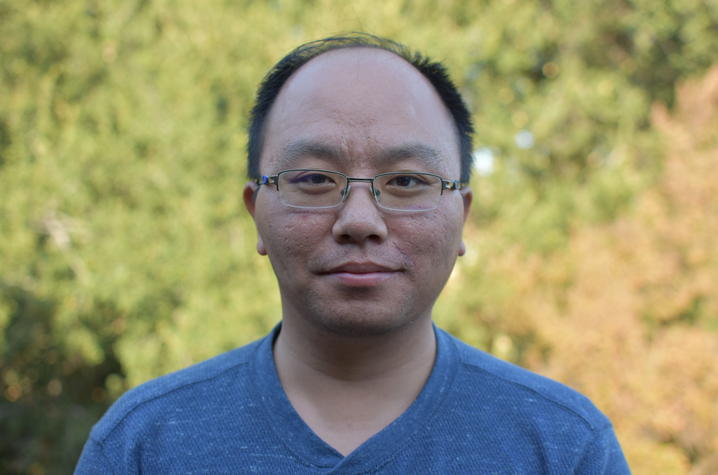Heritage has shaped College of Public Health professor's approach to research

In honor of Asian American and Pacific Islander (AAPI) Heritage Month, the University of Kentucky College of Public Health is highlighting the achievements and contributions of AAPI individuals within its community. This month-long celebration serves to recognize the rich cultural heritage and significant impact that Asian Americans and Pacific Islanders have made in various fields, including academia, research, and public health.
LEXINGTON, Ky. (May 24, 2024) — Growing up in an industrial city in China, Tianjun Lu, Ph.D., developed an awareness of environmental challenges and the relationship between the built environment and public health.
His journey began in Huangshi, a city nestled near Wuhan, China, where he immersed himself in various roles, from working at the Bureau of Urban Planning and Construction Management to teaching English at the esteemed New Oriental School. These experiences ignited his passion for urban planning and propelled him toward further education in the United States.
Lu recently joined the University of Kentucky College of Public Health (UK CPH) as an assistant professor in the Department of Epidemiology and Environmental Health.
"I was drawn to the University of Kentucky primarily because it provides an ideal platform to leverage my multidisciplinary background in urban planning, exposure science and geospatial techniques for advancing environmental health research,” he said.
The warm welcome from the department and the collaborative environment reinforced his decision, making CPH an ideal fit for his research interests.
According to Lu, his Chinese heritage significantly shapes his approach to research and community engagement. He emphasized the importance of understanding the diverse backgrounds and cultures of the communities being studied, ensuring that research efforts are both beneficial and respectful.
"It's crucial to respect diverse cultures and ensure that our research benefits not only ourselves but, more importantly, the communities we aim to shape,” said Lu. “A holistic approach to problem solving ensures that my research is comprehensive and impactful.”
The BEAM Lab
Inspired by his desire to unravel the intricate relationships between the environment and health, particularly in regions grappling with longstanding environmental challenges, Lu established the Built Environment, Air, and Mobility (BEAM) Lab. His vision is to integrate various disciplines such as the built environment — which refers to man-made structures, features, and facilities viewed collectively as an environment in which people live and work — air quality, mobility patterns and public health.
One area that BEAM is working with is the Gulf Region of Texas, specifically the cities of Beaumont and Port Arthur, which have longstanding health and air quality issues.
The project aims to enhance air quality data, empower communities and improve public health awareness in the region. Outdoor air pollution data collected by community members using low-cost sensors will be used to develop models for health impact assessments and health disparity analyses. Ultimately, the project seeks to drive interventions and policy changes to address health disparities and promote health equity in the Beaumont-Port Arthur region.
"We plan to launch follow-up initiatives to incorporate indoor air quality monitoring as well, as people spend more than 80% at home,” said Lu. “Having indoor and outdoor air quality monitoring will be helpful for health intervention studies as well."
Embracing Mentoring and Cultural Pride
The BEAM Lab actively seeks students interested in tackling projects related to environmental health, air quality, and mobility issues.
Lu follows a tailored approach to mentoring that prioritizes students’ interests and passions over their backgrounds. He believes in understanding each student’s aspirations and has mentored 13 students through the BEAM Lab, with many of them securing notable positions or pursuing advanced degrees in related fields.
Regarding advice for underrepresented groups in academia, Lu emphasizes finding one's voice, sharing it confidently, and believing in the value of one's contributions to the academic community. He also encourages authenticity, urging individuals to stay grounded in their cultural heritage as a source of strength and perspective.
"Stay resilient and true to yourself,” he advised. “While embracing the cultures around you, remember that your home culture is also a source of strength. Celebrate with family, friends, colleagues, and those curious about your culture. By staying grounded in your identity, you can navigate challenges with confidence and bring your unique perspective to your work."
As the state’s flagship, land-grant institution, the University of Kentucky exists to advance the Commonwealth. We do that by preparing the next generation of leaders — placing students at the heart of everything we do — and transforming the lives of Kentuckians through education, research and creative work, service and health care. We pride ourselves on being a catalyst for breakthroughs and a force for healing, a place where ingenuity unfolds. It's all made possible by our people — visionaries, disruptors and pioneers — who make up 200 academic programs, a $476.5 million research and development enterprise and a world-class medical center, all on one campus.




